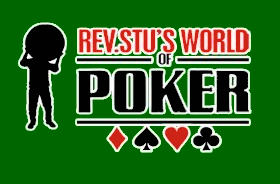|
HOUSE RULES
with The Reverend Stuart Campbell
Sorry, readers. I was indeed lying to you last month. When you’ve
got your chips, cards and playing surface sorted, you’re still not
quite fully equipped for the perfect home game experience. You’re
nearly there, though, so this month we’ll round up the last few
bits and bobs standing between you and a full primary grounding in
successful poker-room management, and the most important one is the
same as the secret of good comedy – cock jokes. (“Timing” – Ed)
Thus
far you’ve probably been measuring your blind levels on a vague,
haphazard sort of basis with your wristwatch, or the dining-room
clock, or a sports stopwatch, or the microwave, or a sundial or the
phases of the Moon or God knows what. I’m not a psychic. That’s all
very well and it’ll get the job more or less done, but there’s no
substitute for a proper poker timer alerting players with
split-second precision to each new level with unmissable loud
beeping noises. They can keep track of the blinds and antes for you,
and they also help to generate the air of unquestioned professional
authority that is the stock in trade of any good Tournament
Director. And if you’re a bad Tournament Director, they can
even do most of your job for you so people won’t notice.
There
are lots of clock-wrangling options depending on your circumstances,
needs and budget. Some people like to use tournament manager
applications for the PC (typically around £15), which offer lots of
features and are handy if you have a computer or laptop in the room
where you’re playing, not so much otherwise. They also tend to be
pretty complicated (because they’re really designed for running big
multi-table games much more complex than our kitchen-table
piss-around) and the chances are they’re going to be massive
overkill for what we’re trying to achieve here - you’ll probably
waste at least as much time figuring out how to operate the software
as it saves you during the game.
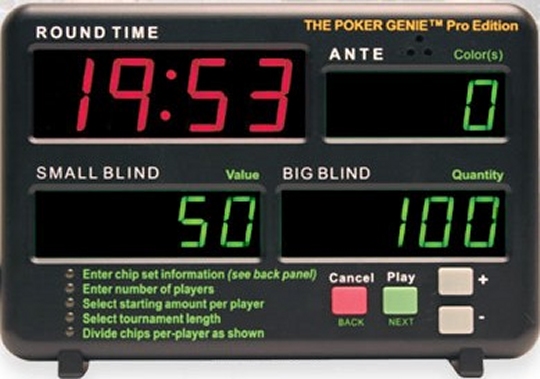
The Poker Genie: slick and handsome, like Omar
Sharif.
If
you’ve got more money to spend or just don’t want to have to lug
your computer around with you, you can splash out £45 or so on a
Poker Genie (or the very similar ESPN Poker Club timer), a very
sophisticated device that tracks blinds and antes as well as time,
displays them so they can be easily seen by everyone, and will even
help you set up initial stack sizes based on your specific chipset
and a structure tailored to your preferred game length. The only
drawback of this splendid piece of equipment (apart from the price)
is the fact that it needs to be run off mains power, and is
therefore susceptible to some dolt tripping over the wire on their
way to the fridge and smashing it to pieces on the floor.
You
can get simple little “dealer button” timers for around a fiver
which count down time and nothing else (they’re basically egg timers
with a pokery makeover), but my personal choice is the WSOP
Official Poker Timer, which is a more advanced
dealer-button-type device managing time, blinds and antes. It’s very
easy to program (and it retains settings when you switch it off, so
you don’t have to set it up again for every game), it's conveniently
portable for games at your mates’ houses as well as yours, and will
run for days on end off a pair of tiny watch-type batteries.
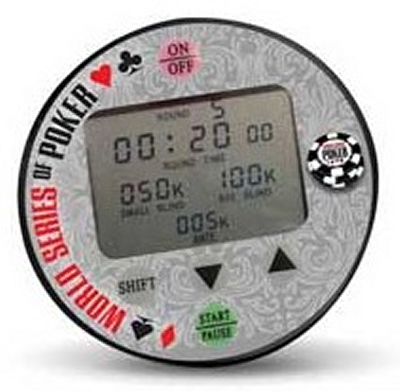
If you do also use this as a dealer button, expect cheating.
You
can pick one up on eBay for about 15 quid (though check the small
print and be sure you get the modern 19-round version rather than
the old 10-round one a few unscrupulous traders still sell), and
it’s all that a halfway-competent host should ever need.
|
FINISHING
TOUCHES
|
|
FRENCH POLISHING
There are several other minor pieces of
equipment that aren’t technically absolutely vital to the
running of a decent poker game, but will give it a much more
professional air and/or make it much easier to manage. Cut
cards, for example (or postillions, to give them their more
strictly accurate name, since in poker you’re not actually
using them for cutting anything) will be expected by anyone
who’s played any sort of vaguely proper poker anywhere.
(If you’re not sure about why, it’s for
much the same reason you burn cards when dealing – it stops
players getting sneaky free information. If you’re drawing to
an Ace or a straight and can see one of the cards you need on
the bottom of the deck, you know your chances of hitting have
been drastically reduced.)
Obviously you can get away without using
dedicated postillions, eg by using a joker instead, but a
proper cut card in nice brightly-coloured plastic has a lot
less chance of getting accidentally shuffled into the deck
every other hand, constantly slowing the game up as you fish
it out again. You’ve come this far, why cheap out for the sake
of a few pennies now?
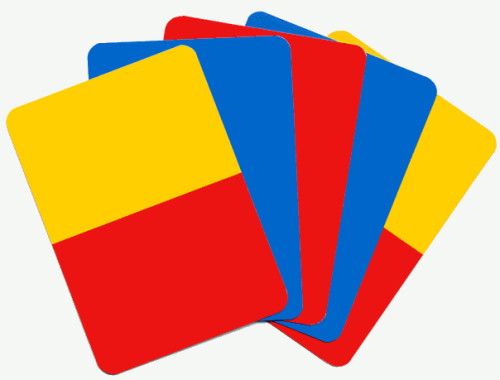
Buying extra-fancy two-tone cut cards will make you appear to
be a foppish dandy.
|
|
OH,
NO, IT'S A CLIP SHOW
For the most basic
home tournament, you can get away with doing everything in
your head. But as soon as you venture into even slightly more
complicated territory (cash games or rebuys, say) you’re going
to want to start keeping track of things on paper.
As well as being
handy in single games, one of the easiest ways of making home
poker more interesting is by maintaining a running leaderboard,
whereby at the end of a certain number of games the worst
player has to buy everyone pizza and beers or perform some
humiliating forfeit, and obviously for that you’re going to
need to keep records. Clearly you can just scribble things
down on any old tatty bit of paper that's lying around, but a
quality notebook or clipboard will make your life a lot
easier. (For one thing, trying to write on a piece of paper on
a poker tabletop is a recipe for torn paper and a disfigured
playing surface.)
And since next
month we’re going to talk about expanding your games into
multi-table affairs – in which you’ll end up horribly lost
without one and be chased out of town by a posse of pissed-off
players – you might as well get yourself down to WH Smiths now
so you’re ready.
|
|
EASY, TIGER
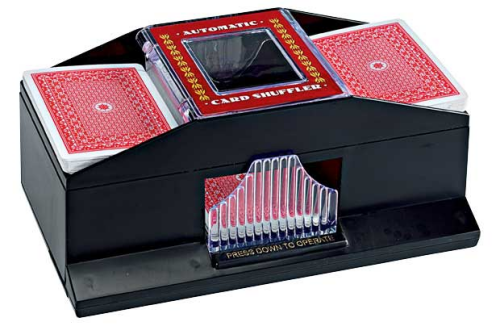
You’ve gotten all carried away. Back up.
|
The Reverend is Assistant Organiser of the
Bristol & South West
Poker Meetup Group, which runs scheduled single- and
multi-table tournaments and cash games at numerous venues across the
region and is sponsored by Poker.co.uk.

(Click the banner to play with other RSWoP viewers, and earn
RSWoP referral bonuses.)
|
